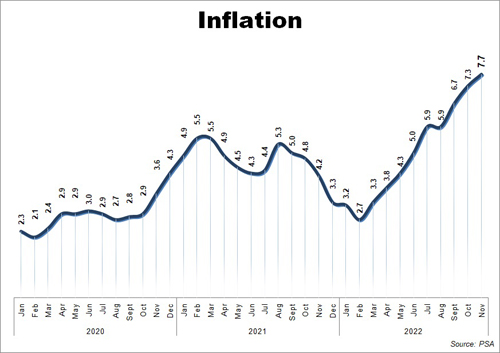The World Bank has revised upwards its growth forecast for the Philippines this year amid the economy’s strong performance in the first three quarters, but slightly lowered its projection for 2023 amid global headwinds.
According to the agency’s Philippine Economic Update released yesterday, the Philippine economy is projected to surge to a 7.2 percent growth in 2022 before tapering off to an average of 5.7 percent growth in 2023.
The economy is driven by the release of pent-up demand from consumers, it said.
In September, the Washington-based agency projected growth for 2022 to be 6.5 percent, while growth in 2023 and beyond was seen to be 5.8 percent.
The World Bank said this year’s forecast rides on the momentum of a 7.7 percent growth in the first three quarters of 2022, buoyed by the removal of remaining restrictions on people’s mobility and business operations and the recovery of incomes and jobs.
The reopening has benefitted the services sector, and government spending on infrastructure fueled the growth of construction and industry, the bank said.
The forecast for 2023 is premised on reduced consumer demand, alongside high inflation and high interest rates that are expected to temper household spending and investments.
“Higher interest rates will likely constrain growth of private lending and investments at a time when public spending will likely slow as the country undertakes ‘fiscal consolidation’ or implements measures to rein in government deficits and reduce debt. Also, as global growth is expected to decelerate next year, external demand from advanced economies, which are key buyers of Philippines merchandise exports, will be subdued,” the World Bank said.
Ndiamé Diop, World Bank country director for Brunei, Malaysia, Philippines and Thailand, said given these developments, it remains important to sustain the country’s investments in health and education to reduce vulnerabilities from the scarring impact of the pandemic especially among the poor and most vulnerable.
“Shocks from the COVID-19 pandemic have worsened child malnutrition and stunting and hampered student learning especially among the poor and most vulnerable families,” Diop said.
“If unmitigated, these shocks can have persistent impacts on people’s wellbeing and damage their future productivity, earnings, and capacities for innovation. For this reason, sustained investments in agriculture, nutrition and education are imperative despite pressure for fiscal consolidation,” he added.
The report said the immediate domestic challenge that faces the country is high inflation, averaging 5.4 percent in the last 10 months, and reaching 7.7 percent in October.
Inflationary pressure comes from multiple fronts including elevated global commodity and energy prices, disruptions in international supply chain and logistics, depreciation of the peso, and domestic supply constraints due to low farm productivity and recent floods and typhoons, the World Bank said.
“High inflation tends to inflict the greatest harm on low-income households where inflation often outpaces wage growth, which these households rely on,” said Ralph van Doorn, World Bank senior economist.
“Besides managing the interest rate, addressing inflation entails employing various measures including freer trade, lower tariffs and non-tariff barriers to help augment domestic supplies as needed and support to agriculture production through extension services, seeds, fertilizers,” he added.
Over the medium term, the World Bank said addressing the weaknesses in the agriculture sector will strengthen food security in the country.





